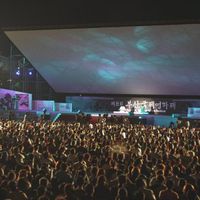Pusan International Film Festival Going On Ten – A Success Story
Certainly the most renowned film festival in Asia, the Pusan International Film Festival (PIFF), will celebrate its 10th anniversary from October 6th to 14th. In less than 10 years, the southern harbour city has established itself as an important place for filmmakers and international film professionals, and has taken the lead among the numerous film festivals in this part of the world. No one could predict such an accomplishment in such a short time, and PIFF has now become one of the symbols (or maybe the result) of the success and vitality of Korean cinema.
From its debut in 1996 until now, the number of screenings, audience, theatres, international guests, and premieres has continually increased, along with its growing influence.
This period (1996-2005) also corresponds to the growth of the Korean film industry that had been through a harsh time in the 80s and the early 90s before regaining popularity at home and abroad. Nowadays, Korea is one of the few countries in the world where local films have a major share at the box-office. Korean cinema, and more generally, Korean pop-culture, is widely popular in Asia and more and more in the West, and has proved its commercial and artistic strength.
The festival was established with the goals of discovering new Asian Cinema and introducing the best of the World Cinema to its audience. Led by Mr Kim Dong Ho, a former Vice Minister of Culture, since its debut, the festival has stuck to its original goals and has successfully handled its rapid growth while more and more professionals from abroad take part in the festival.
First held in 1998, the Pusan Promotion Plan (PPP) was originally conceived as a pre-market for emerging directors (and since, also for confirmed ones), and was built on the same concept of Rotterdam’s Cinemart. During the event that lasts for three days, cinema professionals can meet the directors and producers of a certain number of selected projects to discuss the possibility of cooperation and co-productions. The plan has helped PIFF to impose itself as "the event" in Asia that film professionals interested in Asian cinema should attend.
PIFF has also served as a platform for promoting Korean cinema. Mr Kim, who travels all over the world to attend various film festivals, is the unofficial ambassador of Korean cinema in a certain way. A proof: before the first edition of PIFF in 1996, only three Korean films had been selected in the Cannes Festival. In comparison, in 2005, six feature films were selected in the different sections of what is regarded as the most prestigious festival in the world. It is a strategic choice of PIFF to screen each year a selection of the best Korean films in the Panorama section, which has been very useful in introducing them to numerous festival directors and representatives. Also, PIFF chose, from the beginning, to be a non competitive festival (with the exception of the New Current Awards, which is given to a first or second feature), and has given itself the mission of discovering emerging talents from the region and rediscovering forgotten filmmakers less known to the world film community. Not less importantly, the fiesta atmosphere and the numerous parties have also helped the festival to establish its own signature.
The celebration of the 10th anniversary will, of course, include special events, which were recently announced.
To cite a few, a special APEC programme will take place, showing 20 films from the member countries of Asia Pacific Economic Cooperation, and the Asian Pantheon section will give the audience the chance to (re)discover 30 films considered as "unknown masterpieces".
But the most interesting event must be the launch of the Asia Film Academy (AFA).
This new programme, co-organised by PIFF, the Dongseo University and the Korean Film Academy of Film Arts, will gather 5 renowned Asian directors, 20 beginners in filmmaking and 8 teaching assistants. In this 3-week educational programme, the candidates will participate in workshops, mentoring, seminars, and lectures. At the end of the programme, 2 short films in HD and 35mm will be shot. This great experience will also be the opportunity for the candidates to build a solid network. The film master, Hou Hsiao Hsien, was appointed the dean of the AFA for its inaugural year. Nonzee Nimibtr (Thailand), Yu Likwai (China), Park Ki-young, and Hwang Ki-seok (Korea) will join the programme as well. The programme also offers scholarships and awards in the form of equipments and film stock. For this new programme, 164 applications from 19 countries have been submitted, which proves that the efforts of PIFF to share a unique experience with aspiring directors and to develop their talents are receiving an excellent feedback. The AFA is going to be an annual event.
PIFF owes its success to its good programme, its original focus on the new Asian cinema, the popularity of Korean cinema, its efforts to become a meeting point for professionals interested in Asian cinema, and the enthusiasm of its audience. Beyond this success, PIFF is now looking at the future and trying to share its resources with young Asian filmmakers.
Happy anniversary, PIFF!
by Jérémy Segay
Similar content
from - to
07 Oct 2010 - 15 Oct 2010
By Jérémy Segay
03 Nov 2005
By Jérémy Segay
27 Jan 2006
posted on
06 Jun 2011

